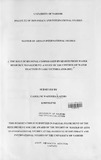| dc.description.abstract | Nature has not endowed every nation on earth with the same amount of resources and at the same time it does not respect national boundaries. One of these natural resources is freshwater. Fresh water is central to life, as no living thing can exist in its absence. It is this intrinsic value of fresh water coupled with the fact that it runs across national boundaries that has the potential to cause or exacerbate conflict between states but also can be a cause of interstate cooperation.
This project is an outcome of a study carried out to determine the role of regional
cooperation among the three East African Countries of Kenya, Uganda and Tanzania in
the management of Lake Victoria, which is a shared freshwater resource among the three countries, particularly in the control of water hyacinth weed. When the water hyacinth first appeared on Lake Victoria, it continued to grow almost unchecked until its peak infestation. The invasion affected the normal utilities of the Lake thus affecting the national economies of the riparian states and threatening the socio-economics of the Lakeside communities leading to the deterioration of their standard of living. The Lake being a shared resource among the three East African states, made it difficult for any of the states to solve the water hyacinth menace individually. Through the use of questionnaires, and qualitative research techniques like focused group discussions (FGDs), the study explored the impact of regional cooperation on the control of water hyacinth particularly on the Kenyan side of the Lake and whether the joint effort of the three riparian states has been successful or had any impact on the livelihood of the
Lake communities living on the Kenyan side. Findings from the study showed that there has been improvement in the control of water hyacinth especially through the efforts of the Lake Victoria Environmental Programme (LVEMP) which is a regional institution formed by the three East African Countries, however according to the findings, when it reaches the bottom level of the institutional structure, it only addresses the lowest institutional members rather than use the institutions to address the members of the community. However if regional cooperation is to have great impact and success in the management of the Lake members of the communities will have to be involved as they are the one who interact with the Lake daily. | en |

